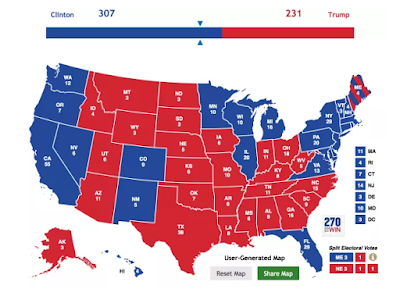The Trump Victory Counterfactual
(Sigh) I feared I’d be
posting some counterfactuals regarding the results of the 2016 presidential
election. And, as if on cue, Nate
Silver has just obliged by providing a fascinating claim:
He writes in this
new post:
"So here’s another question. What would have
happened if just 1 out of every 100 voters shifted from Trump to Clinton? That
would have produced a net shift of 2 percentage points in Clinton’s direction.
And instead of the map you see above, we’d have wound up with this result in
the Electoral College instead:
"Michigan,
Wisconsin, Pennsylvania and Florida flip back to Clinton, giving her a total of
307 electoral votes. And she’d have won the popular vote by 3 to 4 percentage
points, right where the final national polls had the race and in line with Obama’s margin of
victory in 2012. If this had happened, the interpretation of the outcome would
have been very different — something like this, I’d imagine:
- Republicans
simply can’t appeal to enough voters to have a credible chance at the Electoral
College. While states like Ohio and Iowa might be slipping away from Democrats,
they’ll be more than made up for by the shift of Arizona, North Carolina and
Florida into the blue column as demographic changes take hold. Democrats are
the coalition of the ascendant
- The United
States was more than ready for the first woman president. And they elected her
immediately after the first African-American president. With further victories
for liberals over the past several years on issues ranging from gay rights to
the minimum wage, the arc of progress is unmistakable.
- American
political institutions are fairly robust. When a candidate like Trump
undermines political norms and violates standards of decency, he’s punished by
the voters.
"In light of
Trump’s narrow victory, these arguments sound extremely unconvincing. But they’re
exactly what we would have been hearing if just 1 out of 100 voters had
switched from Trump to Clinton. So consider that there might be at least partial
truth in some of these points."
"Likewise, if
Clinton had just that small, additional fraction of the vote, people would be
smugly dismissing the arguments in the first set of bullet points — even though
they, too, would have been just 2 percentage points away from seeming
incredibly prescient."
(Earlier in
the article Silver presented the following four bullet points:
- The
Democrats’ supposed “blue wall” — always a dubious proposition —
has crumbled. Indeed, with Hillary Clinton’s defeat, Democrats may have to
rebuild their party from the ground up.
- But the
Republican Party is also forever changed. The GOP has learned that there’s a
bigger market for populism, and a far smaller one for movement conservatism, than many of
us imagined. The Party of Reagan has been supplanted by the Party of Trump.
- The divide
between cultural “elites” in urban coastal cities and the rest of the country
is greater than ever. Clinton improved on President Obama’s performance in
portions of the country, such as California, Atlanta and the island of
Manhattan. But whereas Obama won Iowa by 10 percentage points in 2008, Clinton
lost it by 10 points.
- America hasn’t
put its demons — including racism, anti-Semitism and misogyny — behind it.
White people still make up the vast majority of the electorate, particularly
when considering their share of the Electoral College, and
their votes usually determine the winner).
“Interpretation
of the polling would also have been very different. If Clinton had done just 2
points better, pollsters would have called the popular-vote margin almost on
the nose and correctly identified the winner in all states but North Carolina.”
Silver’s
counterfactual underscore how precarious the conclusions are that we draw from
contingent events. While they may seem
perfectly obvious in retrospect – indeed, while they often seem predetermined
or foreordained – they are anything but.
Perhaps this
can provide some motivation for all of us to realize how important our
participation is in the political process.



Comments